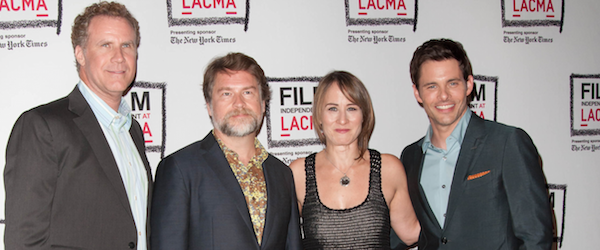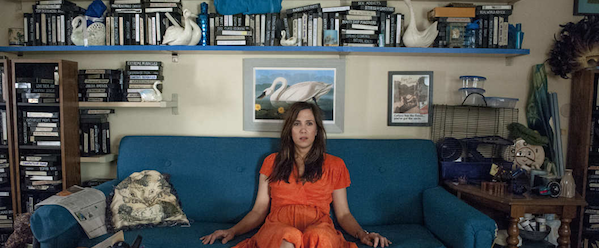Getting Lost in the Timeless World of Welcome To Me Starring Kristen Wiig

Screenwriter Eliot Laurence, director Shira Piven, and actor James Marsden sat down with moderator Dana Harris after the Film Independent at LACMA screening of Welcome To Me, the story of $86 million lottery winner Alice Klieg (Kristen Wiig). She’s a woman with Borderline Personality Disorder who gets rich, quits her meds, and buys a talk show that talks all about her.
Creating a character afflicted with a mental illness is no easy feat. It requires a balance of understanding, sensibility, and a little bit of playfulness. Laurence made it clear that his inspirations for Alice weren’t specific individuals. They were more a conglomeration of nuances that he saw in different people and facets of daily life. He noted, “I feel like we’re all on a continuum of mental stability and we move around a lot on it. So it’s relatable.”
Piven commented on Alice’s quirks and journey: “I feel like Alice was someone we all know, or are, to a degree. We didn’t want her to be a caricature by any means. There’s a little desert flower element to Alice. She’s hiding, but these circumstances have these pitfalls, and they bring her out of herself. She’s really getting to express herself in this movie and the other characters admire that about her—though a television show is probably the worst way to put yourself out there. Susan Matheson is a really great costume designer. We wanted this timeless feel to the Palm Desert environment. So there’s even something a little bit timeless about what she’s wearing…but a little bit off.”

This was Piven’s second time directing a feature film. Harris asked her how daunting this second go was, especially with a movie with a female lead. Piven noted that her first film eased her into this experience plenty enough, “It put me through film school basically, in that it put me through a lot–with production, planning and everything–but it prepared me.”
The trouble with this film was finding financers. She pointed out, “there were a lot of financers iffy on the movie. Some thought, “Oh yeah, Alice should have her own show at the end,” and Kristen said, “No, that’s the wrong one then.” We had to find the ones who got it. The financers we found who worked were from Canada. They gave us freedom. They understood the core, the message, and the tone that needed to come across. We needed the core, and needed it to be real, because Alice is a real person.”
The film was shot in Palm Desert–home to heat, casinos, resorts and dreamy sunsets. “If someone were to get lost,” Harris said, “that’d be the place to do it.” Both Piven and Laurence agreed that the film needed to have that aura of haziness, fluidity, vapidity and of life blooming out of nothing. “I actually did research on where Guthy-Renker Fitness was filmed, and that was the place,” said Laurence. “So we had to go there.”
“We wanted the movie to feel like a timeless world,” Piven said.
Kristen Wiig is a force, a presence. And according to Laurence and Piven, was entirely invested in this role. Laurence collaborated with her offset constantly: “I feel like I was so spoiled as a screenwriter. I had input shooting, and with Kristen for her scenes, like the ones with her prepared statements.” Piven saw Wiig analyze the complexities of Alice’s struggle so thoroughly that at first she feared the comedic tone of the film might suffer: “We hoped she’d love it as much as she did. She didn’t even think of it as comedy at all. She felt it had to be told in a really human way. And so I was afraid in the beginning that she would feel so strongly for the truthfulness of this role that she’d lose the humor. But she’s funny by nature.”
Marsden, who plays a smarmy producer in the film said, “This movie is such a delicate tricky thing–to have an audience so invested and have them approach something so tragic but then be able to laugh… That’s the fun part of what we get to do. We learn what these characters affectations are, quirks, and so on. And for this movie, we were all aligned to what the tone of the movie was. We were all on the same page. You felt something a little at the beginning like, ‘What is this? I’ve never seen anything like this before.’ But you had all these actors wanting to be a part of something strange. It was great.” He praised, “It’s rare to find something bold and courageous and new, and where you just want to be a cog in the wheel.”
A big part of the storyline (not a spoiler, don’t worry): Alice loves Oprah. But Oprah is a brand. To secure the rights to include Oprah’s show, they wrote a very sincere letter that explained Oprah’s influence on culture today and who Alice Klieg was and why she needed Oprah in her life. Piven commented that they started production without knowing if they had the rights, “I would stay up at nights thinking of how to create a fictional character like Oprah. But we’re not making fun of Oprah. She’s brought up the ideas of mental health, of being up front with your feelings, of the idea of therapy and made them okay. It’s made people okay with it and normalized it.”
Harris asked all three about the effect of this comedy. Piven’s reply: “Is it a comedy? I can’t tell still. It deals with mental illness and cultural illness–and that’s what appeals to me about it.”
Jade Estrada / Film Independent Blogger